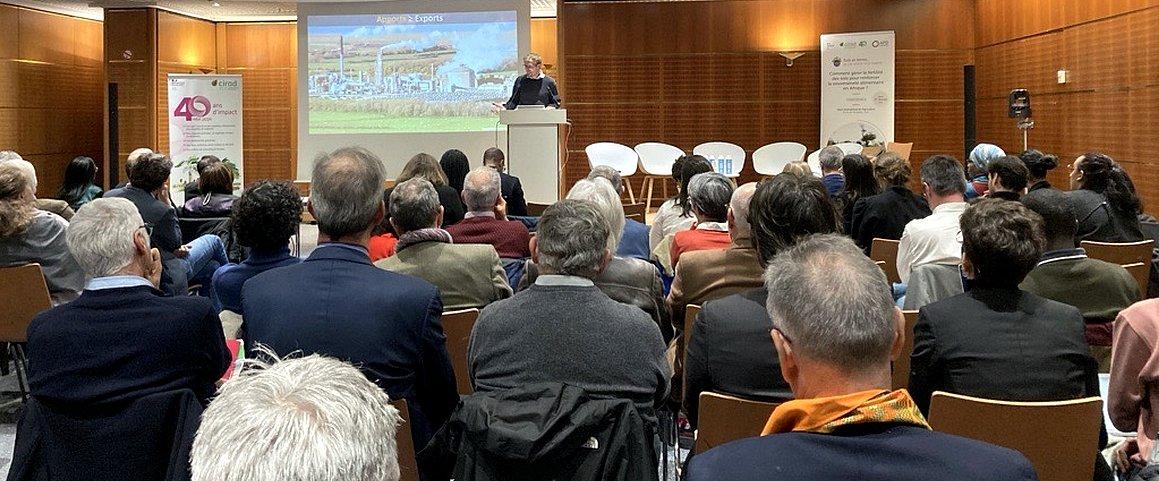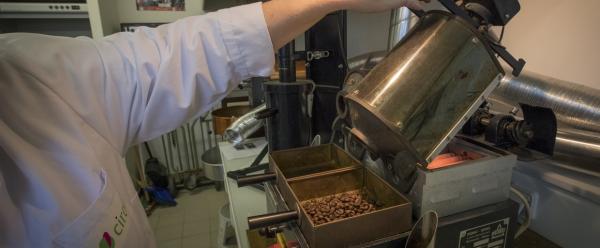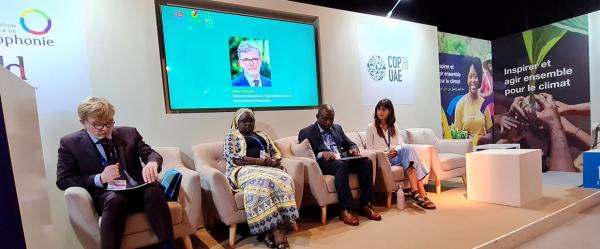Event 18 December 2023
- Home
- CIRAD news
- News
- Food sovereignty in Africa, producing more, and better
Food sovereignty in Africa: how can we produce more, and better?

A conference organized at the 2024 Paris International Agricultural Show by CIRAD and AFD © CIRAD, C. Grether-Remondon
"Over the past five years, the number of people going hungry has risen, particularly in Africa", said Éric Justes, agronomist and Deputy Director of CIRAD's PERSYST department, when introducing the conference on "How can we manage soil fertility to boost food sovereignty in Africa?" organized by CIRAD and AFD. "Covid, climate disruption, the war in Ukraine and local conflicts have jeopardized the progress made towards reaching the second UN sustainable development goal (SDG): End hunger, achieve food security and improved nutrition and promote sustainable agriculture."
At the same time, population growth in Africa has been massive. Eric Justes sums up the issue: "Guaranteeing food security for local people is therefore a challenge in which the agricultural sector has a bigger role to play than ever, notably by increasing yields sustainably".
Unproductive soils in poor health
However, this vital increase is set against a difficult backdrop of circumstances. "There are several reasons for Africa's poor agricultural yields, including a lack of infrastructures, production methods that remain traditional, climate change, and above all very low soil fertility", adds Tantely M. Razafimbelo, agricultural soil specialist and Head of the radio isotopes laboratory at the University of Antananarivo, Madagascar. "Generally speaking, African soils are very short on carbon and nutrients – phosphorus, calcium, nitrogen, magnesium, etc – resulting in low microorganism biological activity. However, it is microorganisms that take part in soil organic matter decomposition, which releases nutrients to plants, and also contribute to soil physical structure, which guarantees their water retention and stability. Managing soil fertility therefore means managing all three aspects of it – chemical (nutrients), biological (microorganisms) and physical (structure) – since they are interdependent."
Agroecology and chemical fertilizers, a winning combination…
Ms Razafimbelo suggests several options for boosting soil fertility. "Our work shows that increasing phosphate fertilizer use does not increase rice yields indefinitely, hence the need to determine the optimum rate. All the more so in that this fertilizer has a cumulative effect in time and that rotating crops with legumes serves to reduce the rate required even further. More broadly speaking, mineral fertilizers alone have shown their limitations, and may even foster plant diseases. They should therefore be used in combination with organic fertilizers, which themselves can be combined with varying degrees of success. Lastly, agroecological practices such as agroforestry also help to boost carbon stocks."
There is no single solution to improving soil fertility: it calls for combinations of solutions including agroecology and chemical fertilizers, as Gatien Falconnier, a CIRAD researcher based in Harare, Zimbabwe, has shown. "Four studies in various countries in sub-Saharan Africa have estimated the maize yield increase required to improve food security at around 6 tonnes per hectare. However, current yields are around 2 tonnes. The main reason for this is a lack of nutrients", he explains. How can we provide enough nutrients to achieve food security? "The agroecological solutions include fertilizer trees and Crotalaria, which are highly effective but of no interest to farmers since they have no nutrient nor commercial value but take up part of their plot. Farmers prefer pulses and manure, but they are not sufficient. To supplement manure, using chemical fertilizers is unavoidable."
However, "we need to make progress in terms of their production, which accounts for 3.5% of greenhouse gas emissions. Furthermore, it is crucial to use the right fertilizer at the right rate, in the right place, at the right time, in combination with agroecology, notably legumes and forest cover, which considerably boost the efficacy of chemical fertilizers", the researcher stresses.
… that calls for a holistic approach
Agroecology and chemical fertilizers should therefore be used in synergy. The snag is that "mineral fertilizer consumption in Africa is very low: it is the equivalent of that in Pakistan", says Mehdi Filali, Senior Vice-President West Africa for OCP Africa, a subsidiary of OCP, the world's leading phosphate fertilizer manufacturer. "Africa produces chemical fertilizers, but 75 to 80% of its output is exported outside the continent, to more lucrative markets, which raises the issue of their accessibility to African farmers", Guy Faure, Senior Policy Officer for research and innovation (AR4D) at the European Commission, explains. "However, there are other reasons for this low consumption: crop response to fertilizers on degraded soils, the risks for farmers of investing in fertilizer if there are not sure of being able to sell their crop because of climate change, and access to credit for input purchases, which is related to the need to stabilize markets and guarantee prices that are both attractive for producers and affordable for consumers."
In fact, as Mehdi Filali points out, "90% of African farmers are smallholders and face a range of difficulties. Access to quality fertilizers is indeed a real challenge, but there is also access to certified seed, to mechanization, to markets, to training, etc. Agricultural development therefore calls for holistic approaches, in partnership with local private- and public-sector players, extension agencies, banks, and so on. For instance, we have worked with research organizations to map the fertility of 50 million hectares of soils. We now need to use those data in the same way as in Ethiopia, where they have served to develop a specific, cheaper fertilizer that has boosted yields by 40%".
"In Ivory Coast, this approach has been used to optimize input use by tailoring it to soil type rather than practising standard manure applications", Nathalie Bogui, technical advisor to the Director General of ANADER and member of the Board of Directors of RESCAR AOC. She is keen to stress that RESCAR favours empowering farmers in terms of both mineral fertilizers and bio-inputs.
"This transition period requires all players to work together and present a united front on the ground, to avoid generating confusion, which would have catastrophic results. Farmers have to understand why, after selling them one way of doing things for anything up to 40 or even 60 years, we are now making their work more complicated!"
Lastly, "studies of off-farm organic fertilizers and biofertilizer production have also had interesting results, covering between 20 and 40% of plant nutrient requirements while creating local jobs. In Egypt, South Africa and Ghana, urban organic waste recycling systems, combined with cleanliness operations, have proved successful" Guy Faure explains. To give another example, "Egypt is leading the field in terms of biofertilizers based on nitrogen-fixing bacteria, which could enable local production that would help to empower agricultural communities."
"In view of its population growth rate and current production capacity, Africa will need several tens of millions more hectares of cultivated land by 2050 to satisfy demand for food", said CIRAD CEO Élisabeth Claverie de Saint Martin, in closing the conference.
"To ensure that this increase does not come at the expense of natural ecosystems and biodiversity, we need to produce more per hectare. There are many complex ways of achieving this, as our discussions have shown. And it is clear that we cannot do without agroecological approaches, or efficient recycling, or mineral fertilizers. However, there is no point in using such fertilizers unless they it serves to improve food sovereignty in Africa, while alleviating poverty among farmers. Scientific research needs to help define how and where it is appropriate to use them."


























